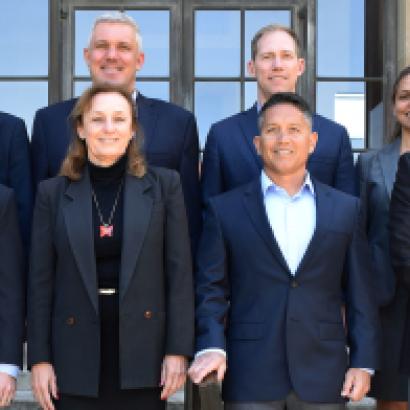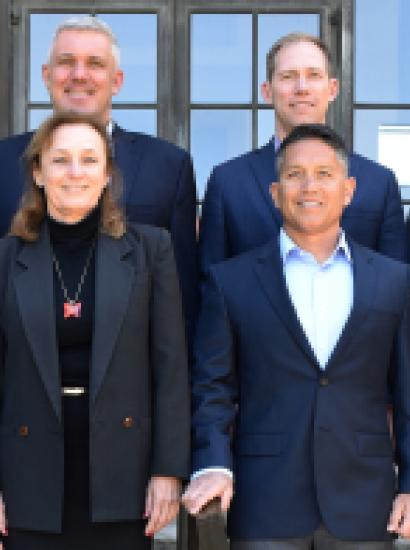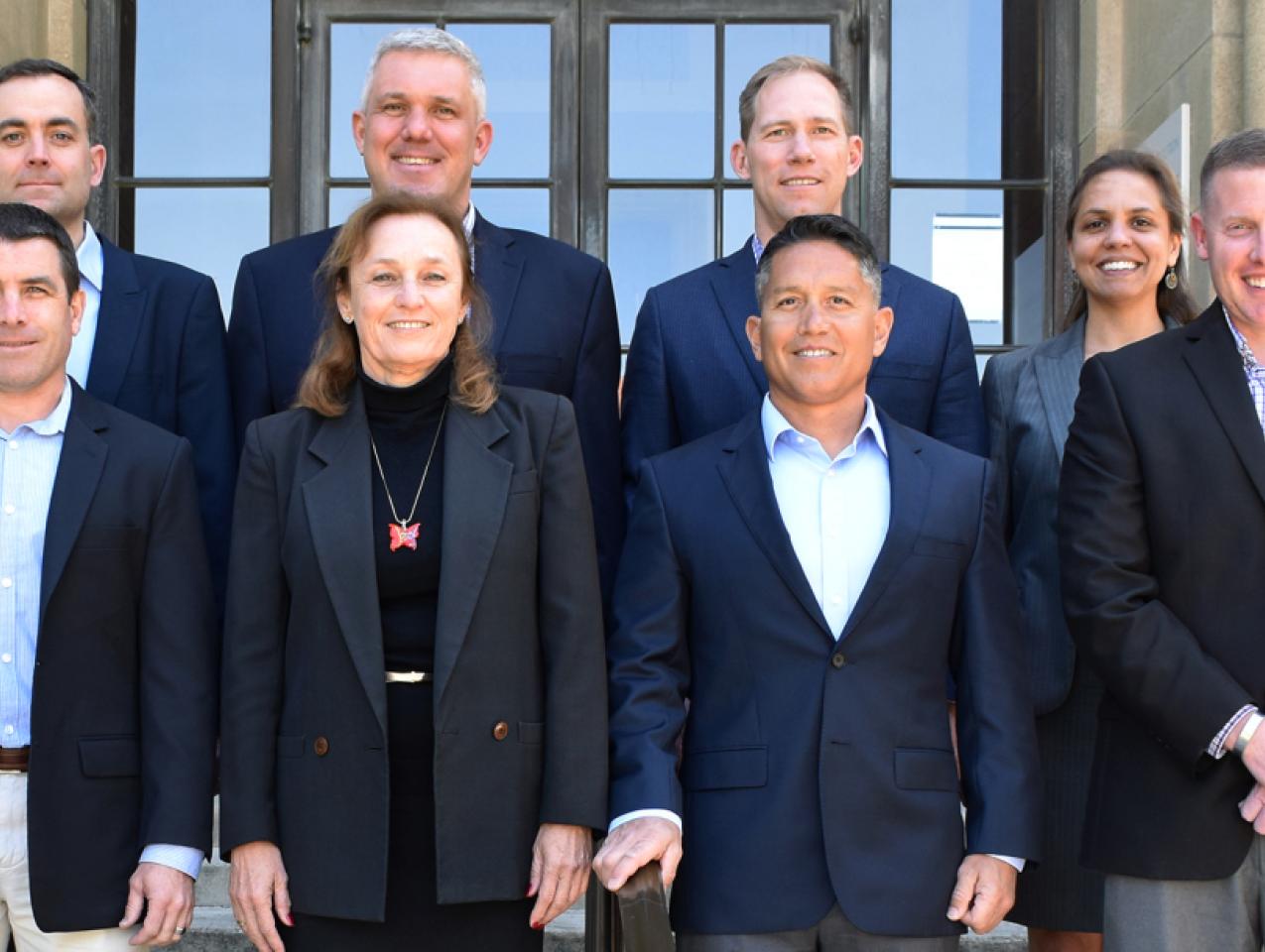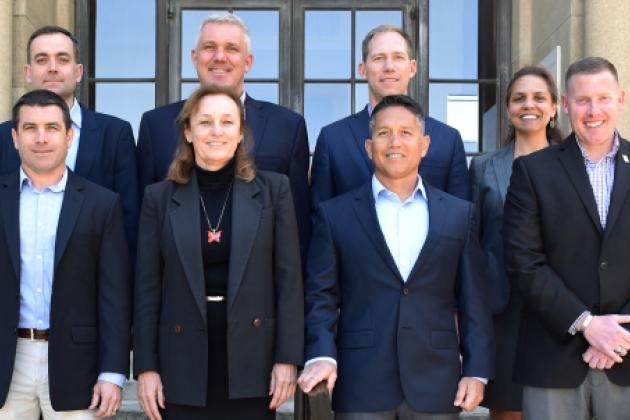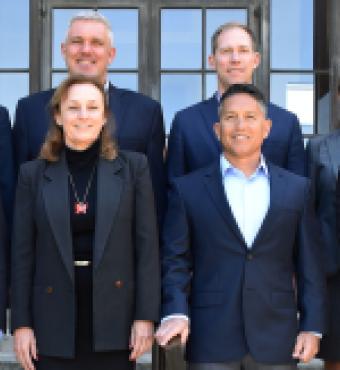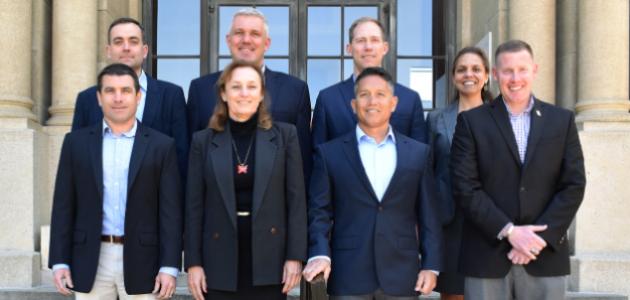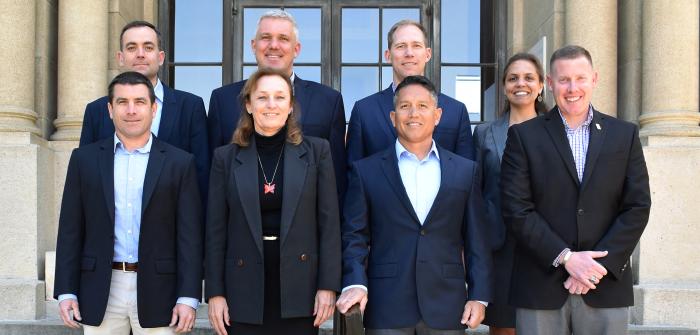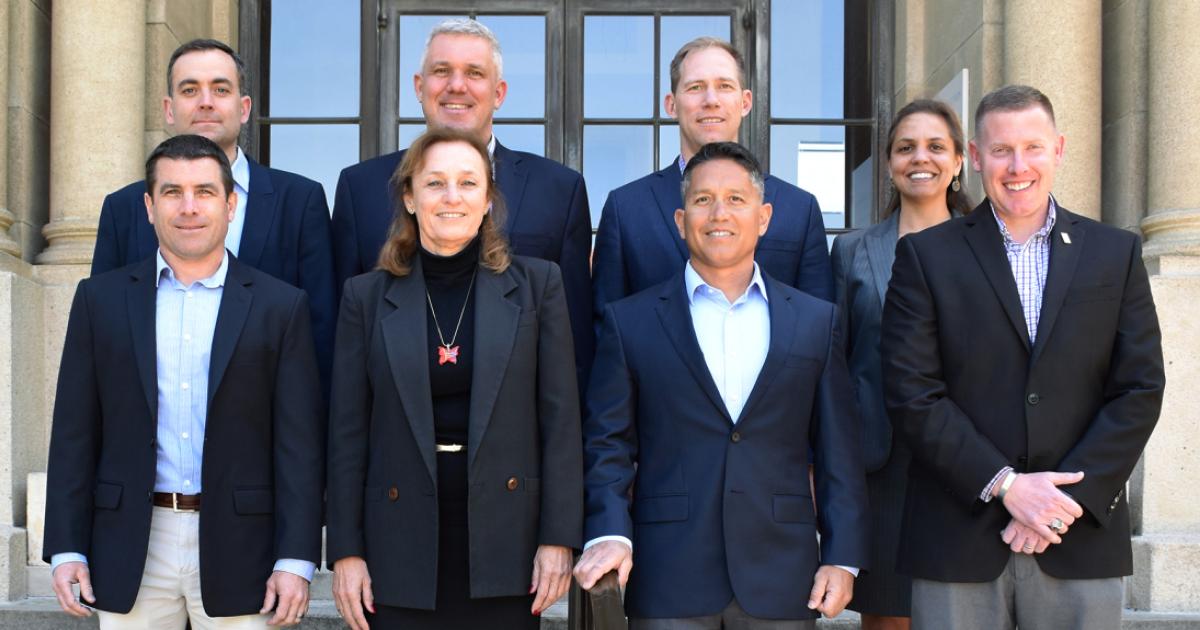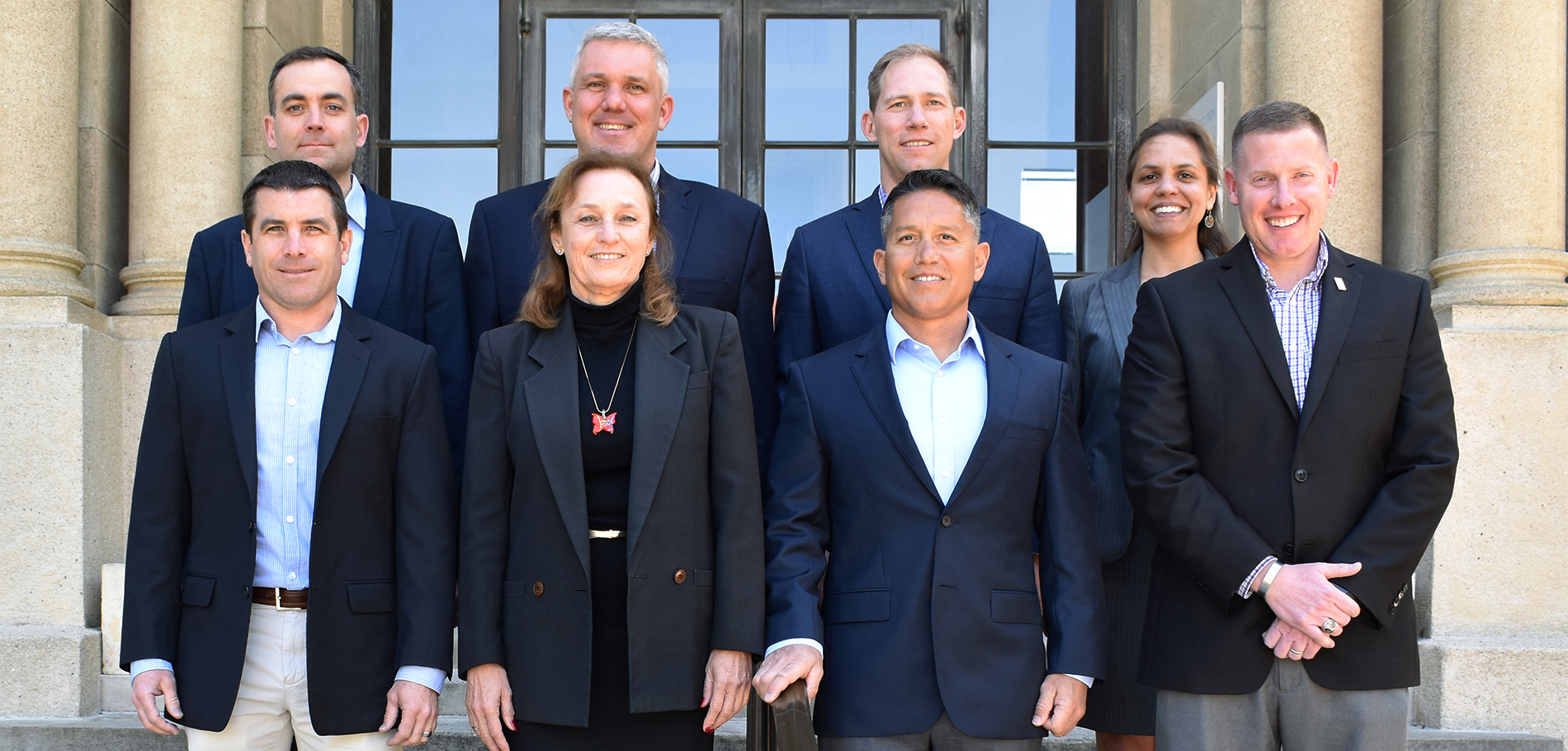
Each year, the Department of State and the five branches of the US armed forces select a small group of rising leaders from their ranks for senior-level education programs. In addition to military service schools such as the Army, Air, and Naval war colleges, the Hoover Institution is one of a handful of policy research organizations authorized to host such personnel for their year of study and professional development.
Made possible through the generosity of Hoover Overseer Robert Oster and his wife Marion, Hoover’s year-long, in-residence National Security Affairs Fellowship is a top choice for diplomats and members of the armed forces. The program is directed by Amy Zegart, the Davies Family Senior Fellow at Hoover, and offers mentorship from giants of foreign policy and security strategy such as George Shultz and Condoleezza Rice, as well as one-of-a-kind connections to a top research university and the United States’ geographic center of innovation and high-tech. Importantly, Hoover’s program also provides the time and freedom necessary to take advantage of these resources. Stepping back from the day-to-day obligations that dominate military and diplomatic leadership, National Security Affairs Fellows—or “NSAFs” as they are known around Hoover—can both learn from and contribute to big-picture conversations about the United States’ strategic future.
Soldiers, Diplomats, and Serious Scholars
Like all Hoover programs, the core of the National Security Affairs Fellowship is research, attracting participants whose work as scholars matches their accomplishments as diplomats and soldiers. Representing the US Air Force in Hoover’s 2017–18 NSAF class, Colonel Jason “Shrek” Terry commanded a 232-person C-130 squadron in deployments to Afghanistan, Africa, and in support the US Forest Service before beginning his most recent posts in Naples, Italy at NATO’s Allied Joint Force Command and US Naval Forces Europe/Africa Command. He also holds graduate degrees in military arts and sciences and airpower art and science and came to Hoover with a research project already selected to support an Air Force division at the Pentagon.
“Warfare has changed since the end of the Cold War,” Terry explained in a recent interview about his research at Hoover, which explores the future of deterrence and strategies for containing Russian influence in Eastern Europe. One of the key lessons of his work is the need to pair traditional kinetic capabilities—he pointed to a 30mm GAU-8 rotary cannon shell mounted in his office as an example—with strategies for deterring adversaries in emerging domains such as cyberspace. After finishing his year as an NSAF, Terry will be applying his research to future missions in Eastern Europe and Africa as he takes command of the 435th Contingency Response Group at Ramstein Air Base, Germany.
Commander Michael Nordeen, representing the US Navy in the 2017–18 NSAF class, has an extensive flight record piloting F-14s and F-18s and served most recently as the commanding officer of Strike Fighter Squadron 211 at Oceana Naval Air Station in Virginia Beach. He also holds a degree from West Point in mechanical engineering, a master’s degree in international economics from Saint Petersburg State University in Russia, and an MBA with greatest distinction from Vlerick Business School.
One of Hoover’s principal draws for Nordeen was its economic research, and his interest in economic policy is reflected in his work on the national security implications of the United States’ debt and deficit, which he argues have created a “weak spot in our ability to lead the international order” that our adversaries are already exploiting. In addition to that research, Nordeen has published a series of op-eds on national security topics during his time at Hoover, including his most recent piece in Real Clear Defense that argues against a proposed ban on personal mobile devices in the Pentagon. Tapped to enter the Navy’s nuclear carrier command pipeline after completing his fellowship, Nordeen has also been taking advantage of his time on campus at Stanford to take classes and brush up on nuclear physics, calculus, and chemistry.
Outreach in the Public Policy, Academic, and High-Tech Community
Each new class of National Security Affairs Fellows represents a major influx of military and diplomatic expertise at Hoover, and NSAFs find their input in high demand among Hoover fellows, Stanford students and faculty, and the Silicon Valley high-tech community. Lieutenant Colonel James “Gumbo” Coughlin, Hoover’s second Air Force representative in the 2017–18 NSAF class, describes the opportunity to share his military perspective in academic and private sector discussions as the key differentiator of his experience from that of his Air Force colleagues studying at other institutions.
In addition to his degrees in information systems, special operations/low intensity conflict, and strategic studies, Coughlin is currently pursuing a doctorate in education leadership and served most recently as the senior executive officer to the deputy chief of staff for Air Force Strategic Plans, Programs and Requirements at the Pentagon. He and his wife drove to Hoover from the East Coast with two dogs and eight children in tow—including their three-week-old baby. An outreach enthusiast with a schedule that would intimidate anyone not accustomed to military life, Coughlin maintains a blog titled An Airman Goes to Stanford, which documents his work and shares his readings as a resource for Air Force colleagues.
Coughlin, along with all seven NSAFs representing the armed forces, serves as a course adviser for Stanford’s Hacking for Defense program, helping students understand military needs and practices and connecting them to armed forces resources as they work to crack real-world defense technology problems submitted by the DoD and other agencies. In addition, each NSAF works directly with a number of Stanford students assigned to them via Hoover’s NSAF mentor program.
A new program launched by the 2017–18 class, “Take a Break with the NSAFs,” invites Hoover fellows, Stanford students and faculty, and local members of the armed forces/State Department community to Hoover for an NSAF-led brown-bag discussion. Each session covers an NSAF’s current research or an area of expertise, with topics to date including cyber hygiene, the state department, and, most recently, a talk by Lieutenant Colonel Marcus Ferrara on security cooperation in Southeast Asia.
Ferrara, the US Army representative in this year’s NSAF class, based his talk on his experience as a foreign area officer stationed in that region. He has served as chief of the Office of Defense Cooperation at the US embassy in Cambodia and as a security cooperation officer in Thailand, holds a master’s degree in Asian Studies from the University of Hawaii, and spent a year studying Thai at the Defense Language Institute.
“The opportunity to come to a place where such eminent scholars produce their work was a privilege I wanted to take advantage of,” explained Ferrara in a recent interview about his time as an NSAF. A longtime follower of Hoover fellows such as Thomas Sowell, Milton Friedman, Amy Zegart, and Victor Davis Hanson, and with two of his mentors having previously completed the NSAF program, Hoover was his first choice among five senior-level education opportunities available to Army personnel who have already completed master’s degrees. “It’s a competitive process,” he continued, “so I was very fortunate to receive such an opportunity.”
Constance Arvis, Hoover’s State Department representative in the 2017–18 class, quips that she’s the “odd man out” as the only civilian NSAF. As such, she plays an important role in the program as a conduit to the world of diplomacy. She comes to Hoover from her last assignment as deputy chief of mission (DCM) at the US embassy in Luanda, Angola, earning a nomination for the State Department’s James A. Baker III Award for outstanding work as DCM for her service in that role.
In addition to using her time at Hoover to write about biosecurity and pandemic preparedness—her time in Angola coincided with a yellow fever epidemic—Arvis organized and moderated a panel presentation by Stanford experts on biosecurity/pandemics for Hoover supporters in July 2018. She has participated in several Stanford courses, regularly finding herself discussing State Department life with students interested in diplomacy or connecting faculty to State Department officials. Given the immediacy of the topic during her time at Hoover, she has also given several well-received presentations to various community groups on the “State of the State Department.” In addition to the Stanford community, Arvis explained in a recent interview that Hoover’s connections to the high-tech world have been a crucial part of her experience at the institution. “It’s really important to understand what Silicon Valley means,” said Arvis, who was selected to lead the State Department’s Office of Science and Technology Cooperation after completing her detail at Hoover. “I didn’t really understand it until I got here,” she continued. “It’s a very different way of thinking.”
Hoover’s links to the high-tech community have also been an important resource for Lieutenant Colonel Jer “Jay” Garcia, Hoover’s Marine Corps representative in the 2017–18 NSAF class. Garcia, who followed the work of Jim Mattis, H.R. McMaster, and Ash Carter during their time as Hoover fellows, locked his sights on a fellowship at the institution in 2014. He arrived three years later with the intention of building on his graduate research on the South China Sea, but soon decided the opportunities to work with Silicon Valley high-tech leaders such as Defense Innovation Unit Experimental (DIUx)—the DoD technology accelerator based nearby in Mountain View, California—were too good to pass up.
Garcia has used his year as an NSAF to study defense applications of artificial intelligence and automation technology. “We’ve never had a technology that’s this revolutionary and will cause so much change to national security,” he explained in a recent interview, comparing the rise of AI and automation to that of the aircraft or nuclear weapons. By studying these emerging technologies before they reach their full potential scale, he hopes to help the US defense community stay ahead of its adversaries.
Liaising with their counterparts at institutions such as DIUx, NSAFs also strengthen Hoover’s role as a resource to the larger defense and diplomatic world. One major NSAF-led conference hosted during the 2017–18 program was a daylong forum that brought the Coast Guard’s Alameda, California-based West Coast leadership team to Hoover to meet with fellows and other experts about cybersecurity and maritime operations, Asia-Pacific strategy, and climate security and the Arctic. Captain Michael Schoonover, representing the Coast Guard in this year’s NSAF class, organized the conference around his current research areas, which in turn draw on his experience in command of a Seattle-based unit that provides security to the Navy’s nuclear submarines operating in the Pacific Northwest.
“It was a great day,” said Schoonover looking back on the conference. “There’s been significant follow up after the event and it sounds like Coast Guard leadership will be back.”
Commenting more broadly on his experience in the program, Schoonover explained “I’ve never reported anywhere and felt so welcome as I have as an NSAF, both here at Hoover and more broadly on the Stanford campus.”
“Everywhere we go I feel like we are welcomed, provided great resources, and just every opportunity,” he continued. “Pretty much every part of Hoover is here to support us.”
Commander Rebecca Ore, also representing the Coast Guard in the 2017–18 class, reported an equally positive experience in the NSAF program. Ore holds a master’s in public policy from the Woodrow Wilson School at Princeton University and has held a number of policy roles in addition to her Coast Guard operational assignments, including at the National Security Council, Office of Management and Budget, and the House Appropriations Committee.
“The fellowship is an executive education program” Ore explained in a recent interview about the NSAF program, “it provides the opportunity to reflect, challenge and grow."
A Rare but Crucial Opportunity for Development
For armed forces and State Department personnel, the time to slow down, look up from the day-to-day obligations of a career, and develop as a leader and strategic thinker is rare. When such opportunities do arise, as demonstrated by each tremendously active class of National Security Affairs Fellows, rising military and diplomatic leaders take full advantage.
And though an academic schedule, with its more normal pace of life and extra time for family, is always cited as a welcome perk of the NSAF program, the regimen of military and diplomatic life never pauses completely.
“I still get up at 4:20 in the morning,” joked Lieutenant Colonel Coughlin while talking about the program. “But now,” he laughed, “I go to the gym.”







